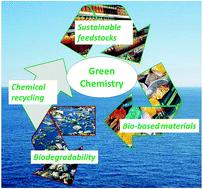当前位置:
X-MOL 学术
›
Green Chem.
›
论文详情
Our official English website, www.x-mol.net, welcomes your
feedback! (Note: you will need to create a separate account there.)
Green chemistry and the plastic pollution challenge: towards a circular economy
Green Chemistry ( IF 9.3 ) Pub Date : 2020-09-18 , DOI: 10.1039/d0gc02630a Roger A. Sheldon 1, 2, 3, 4, 5 , Michael Norton 6, 7, 8
Green Chemistry ( IF 9.3 ) Pub Date : 2020-09-18 , DOI: 10.1039/d0gc02630a Roger A. Sheldon 1, 2, 3, 4, 5 , Michael Norton 6, 7, 8
Affiliation

|
The linear economy for plastic packaging, which currently leads to excessive carbon dioxide emissions and leakage into the environment, needs to be reformed to a greener circular model which is resource efficient and environmentally benign. This requires a system-wide redesigning of rules and incentives that apply to the plastics value chain, from product design to recycling and end-of-life options. This article identifies areas where green chemistry can contribute. Substituting plastics derived from fossil resources, with bio-based alternatives from renewable resources can reduce emissions of greenhouse gases, produce plastics that are easier to recycle to the virgin polymer and, at the end of their useful life, biodegrade in the environment. The underpinning chemo- and biocatalytic technologies for the production and recycling of plastics are reviewed and priorities suggested for future development.
中文翻译:

绿色化学与塑料污染挑战:迈向循环经济
塑料包装的线性经济目前已导致二氧化碳的大量排放和向环境的泄漏,因此需要对其进行改造,使其成为更环保的圆形模型,这种模型具有资源效率和环境友好性。这就要求在整个系统范围内重新设计适用于塑料价值链的规则和激励措施,从产品设计到回收再到报废选项。本文确定了绿色化学可以做出贡献的领域。用化石资源中的塑料代替可再生资源中的生物基替代品,可以减少温室气体的排放,生产易于回收利用为原始聚合物的塑料,并且在其使用寿命结束时,可以在环境中进行生物降解。
更新日期:2020-10-05
中文翻译:

绿色化学与塑料污染挑战:迈向循环经济
塑料包装的线性经济目前已导致二氧化碳的大量排放和向环境的泄漏,因此需要对其进行改造,使其成为更环保的圆形模型,这种模型具有资源效率和环境友好性。这就要求在整个系统范围内重新设计适用于塑料价值链的规则和激励措施,从产品设计到回收再到报废选项。本文确定了绿色化学可以做出贡献的领域。用化石资源中的塑料代替可再生资源中的生物基替代品,可以减少温室气体的排放,生产易于回收利用为原始聚合物的塑料,并且在其使用寿命结束时,可以在环境中进行生物降解。











































 京公网安备 11010802027423号
京公网安备 11010802027423号